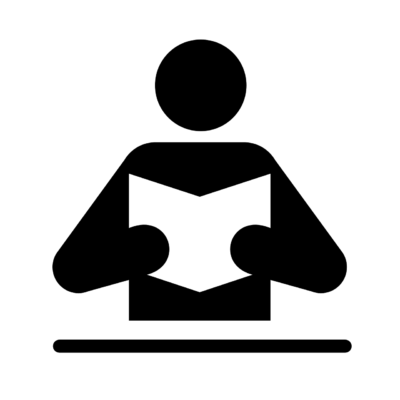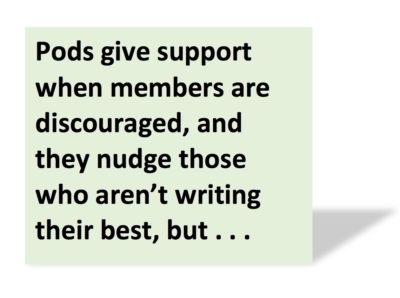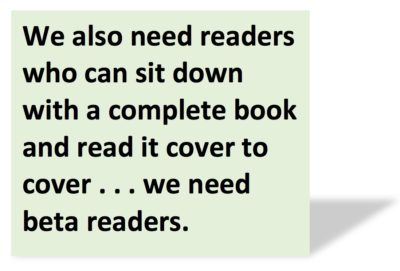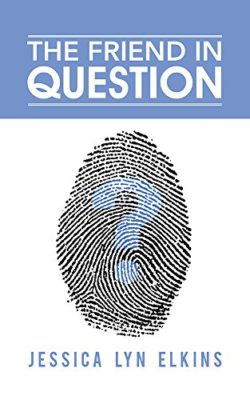
One of WAG’s first undertakings was to form critique pods, groups of five or six writers who could meet regularly to read each other’s work and give feedback.
Today, we have thirteen pods! One for children’s literature, one for poetry, one mixed genre, five fiction (primarily novels), and five nonfiction (primarily memoir.) Mostly, our members are writing long-form stories. One pod meets weekly; others once or twice a month. The most ambitious pods have a word limit of 3000 for each submission.
The problem is, if someone had given you a copy of Gone with the Wind for Christmas and you started reading at that rate, you’d stand on the hill overlooking Tara, secure at last, sometime in March, 2021!
Most novels published today are about a sixth as long as that classic. Still, at WAG’s fastest rate, critique groups can complete a first draft of a 90,000-word novel in a minimum of 30 weeks. Over those seven months, a member or two will join, some will leave. Members will miss pieces of stories. Everyone will forget important details.
 Much of the critiquing I’ve heard in visiting pods has been of a very high quality. Line editing, especially, is excellent and both those submitting, and those giving feedback are improving their craft from the experience. Pods give support when members are discouraged, and they nudge those who aren’t writing their best, but . . .
Much of the critiquing I’ve heard in visiting pods has been of a very high quality. Line editing, especially, is excellent and both those submitting, and those giving feedback are improving their craft from the experience. Pods give support when members are discouraged, and they nudge those who aren’t writing their best, but . . .
What pods can’t do is critique a novel or long-form memoir as a whole. A thread can be dropped, and no one notices five months later when the book ends. The pace may drag endlessly, but since each piece is read in isolation, readers don’t sense the problem. A character might be a vegan in one chapter, but five chapters later, she’s hunting, stewing, and chomping down on cute little bunnies. Or she does one thing and then another thing and then something else. No question is raised or answered, no problem solved. She might never make a decision, try to overcome a weakness, be defeated by an enemy, or achieve a goal; and no one notices because each little piece is so beautifully written.
To learn whether we’re successful in telling a story, we also need readers who can sit down with a complete book and read it cover to cover. In addition to critique pods, we need beta readers.
I’m not talking about editors. What we need are people who will read the manuscript from start to finish, who will tell us when the story is boring or confusing or contradictory, if the beginning gets them involved, if the middle keeps them wondering, if the end is satisfying.
Jessica Elkins, a member of WAG’s “Peas in a Pod” fiction pod, recently sought feedback from a women’s book group on the manuscript of her second novel, A Question of Family. Here is her account of the process and what she learned:
I belong to a women’s book group of about 12-15 members. The group had asked me to lead a discussion on my first novel, The Friend in Question, a story of friendship, family secrets, and life changing coincidences.
At the end of discussion, many asked if there would be another book. Happily, I told the group I had recently finished the sequel, which is entitled A Question of Family. Two people, whom I did not know well, told me there were unanswered questions at the end of the first book. I left the meeting and pondered their observations. Within a week, I realized I needed beta readers for the sequel. I took a chance and asked the two women, separately, if they would agree to be beta readers.
Learning from past mistakes of handing over a box of loose manuscript pages to a close friend to read, I devised a strategy as follows:
- Provide a list of questions for the reader.
- Provide a short summary of the book and a list of characters including their descriptions.
- Provide a spiral-bound copy of the 70,000-word manuscript that would be easy to handle.
- Provide a table of contents with chapters and page numbers in the manuscript for easy reference during discussion.
My Questions for Beta Readers:
- This is a sequel to The Friend in Question, which you may or may not have read; does this new story stand alone or would one have to read the first book to understand this one?
- Were the characters in the sequel well developed? Were they believable? Who was the most sympathetic character? Whom did you dislike the most? Why?
- Was the timeline and flow of the story easy to follow?
- What for you was the climax of the story?
- Was narrative and dialogue balanced?
- What were weaknesses in the plot? Strengths?
I asked if the readers would complete the project within 30 to 45 days. My second request was that we meet in person to discuss their thoughts on the story. It was also agreed that they would provide answers to my questions. I recommended the readers not act as editors, but if errors were found, only to circle them in red and keep reading for story content. Later, to my surprise, I discovered that both women had been English teachers. They took the project very seriously and complied with all my requests. Neither reader was told the identity of the other as I preferred no communication between them until after the beta process was complete.
During the discussions, which were very frank, they made many pointed suggestions. I have since re-written the opening scene, changed the order of a few chapters and rewritten key parts of the climax of the story. I was able to see flaws that I had not recognized but that were easily fixed. One person loved the ending and the other one disliked it. Their insights were invaluable to me.
Other observations: I think it is risky to ask someone who knows you really well to serve as a beta reader. A close friend may not be as honest with you as a stranger, one who often reads in your chosen genre. The questions I asked were key to changes I made to improve the story.
Many thanks to Jessica for this information.
Now, WAG wants to start a beta reader program, reaching even outside WAG’s membership to members of book clubs. If you are interested in serving as a beta reader, please contact me, Skipper Hammond.
 Jessica Lyn Elkins grew up in a small town in the Texas Panhandle. She moved to New Mexico in 1968 where she lived for 44 years. She earned a BA from the University of New Mexico and graduated from St. John’s College of Santa Fe with an MA in Liberal Education. A varied career path included stints as a general contractor, ice cream shop owner, and human resources manager for automobile dealerships. Since her relocation to Florida, Elkins has published two books, The Friend in Question (2015) and a book of poetry and prose reflections entitled A Coyote Taught Me Poetry (2016).
Jessica Lyn Elkins grew up in a small town in the Texas Panhandle. She moved to New Mexico in 1968 where she lived for 44 years. She earned a BA from the University of New Mexico and graduated from St. John’s College of Santa Fe with an MA in Liberal Education. A varied career path included stints as a general contractor, ice cream shop owner, and human resources manager for automobile dealerships. Since her relocation to Florida, Elkins has published two books, The Friend in Question (2015) and a book of poetry and prose reflections entitled A Coyote Taught Me Poetry (2016).

Connie Morrison
Lots and lots of good information here for writers looking for feedback (aren’t we all?). Thanks, Skipper, and Jessica, for giving me some important things to think about and hopefully act on.
Kenneth U. Campbell (writing as Ken MacKennic)
I have been a member for almost a year – told I would be in a pod – and one has yet to form. I write adult fiction, often satiric. I am a serious writer – having studied with Smith Kirkpatrick for 4 years, then Harry Crews off and on until he passed. You can read Luke’s Run by Ken MacKennick on Amazon Kindle. I am also the writer and publisher of Great Leaps Reading, an innovative program to teach reading to those who struggle – about 100,000 copies sold.
Skipper Hammond
Ken, I’m sorry the writers I put you in contact with were unable to start a new critique pod. And I’m sorry you didn’t let me know. If I had known you were still interested, I would have referred you to an established pod when one had an opening or to other WAG novelists trying to organize themselves into a pod. I believe you were given my email address. And it’s on this website on the pod page.
Anyone interested in joining a pod should contact me, the pod coordinator. Or, if you see a pod listed on this website that looks like it might work for you and it’s shown as having an opening, you may email the pod leader directly. To find the pod leader, click the picture on the home page, top right under “Critique Pods;” then click the plus sign by the kind of pod you’re interested in. You’ll also find a link to me in the description of pods.
Jack Owen
A ‘Beta Reader’ would be a wonderful additional program for WAG members to participate in. It might best work as a reciprocal trade – a book for a book as incentive – anonymously. A direct trade, ‘you read mine, I’ll read yours’, could skew reactions.
How and Who would keep track might take an Einstein mind, adept at schedules and book keeping, to develop, though. Farming the task/joy out to rabid readers who would agree to be bound by the requirements of the writer (as in Jessica’s guide lines) would also put the Book into hands of Readers – instead of just writers.
Brilliant !
Bonnie Ogle
Skipper, this was great. I’ve often thought our critiques are good, but disjointed. You nailed the problem. Hope we get some beta readers but we may have to look outside WAG. Thanks for this post.
Ann-Marie Magné
I am beta-reading something now, and I find it very difficult to put aside my critique pod habits. I was asked to do the same things outlined by Skipper: “read the manuscript from start to finish … tell us when the story is boring or confusing or contradictory, if the beginning gets them involved, if the middle keeps them wondering, if the end is satisfying.” I think looking outside WAG might be the best idea. Maybe anonymous readers would be the way to go. In the meantime, I need to rein in my inner-editor and just read! Thanks, Skipper and Jessica. Great ideas, tips and examples.